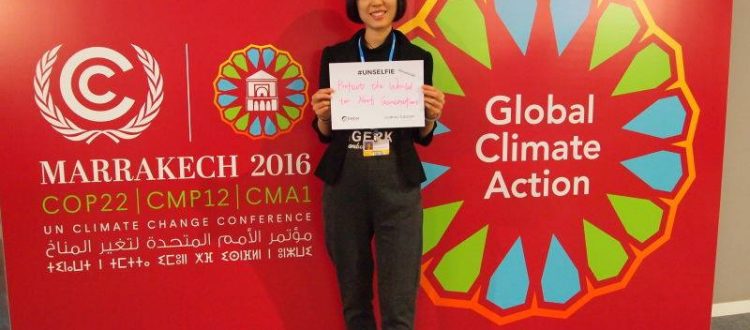Insight on COP22
MARRAKECH (Nov. 10, 2016) – GEI was invited by the National Climate Strategy Center and the Chinese Academy of Agricultural Sciences to participate in the “Climate Change and Rural Development”-themed side event hosted today at the China Pavilion at the COP22 Event in Marrakech, Morocco.

Mme JIN Jiaman (at podium) and JI Lin (left) introducing GEI at the China Pavilion – GEI 2016
While climate change negotiations have historically focused bringing big, rich developed countries with mounting CO2 emission problems and excess resources like the United States, China and India to task, issues of international climate change do not stop here. In fact, the impact of a faltering environment affects all countries, especially the smaller, developing nations.
Southeast Asian countries exemplify how these smaller, less developed countries are vulnerable to climate change: as the seasons, water levels, grasslands and forests flood, shrink and reach new extremes, these countries are unequipped to adapt their policies, livelihoods, industries and community response.
The “Climate Change and Rural Development” themed side event focused on the issue of how a changing environment impacts rural communities and called on the international community to pay attention and help.
Representatives from countries including Vietnam and Myanmar, joined the side event and shared first-hand accounts of the changing environment and struggling communities in this region. To the crowd of policy makers, professionals and NGOs, these representatives outlined their personal experience dealing with climate change and held discussions to explore possible areas of cooperation.
GEI Myanmar Pilot Project Highlighted
During the meeting, the deputy director general of Myanmar’s Department of Forestry, within the Ministry for Resource and Environment Protection, U Pe Chit, was joined with the chairman of Myanmar Environment Innovation Fund (MEIF), U Win Aung, who introduced MEIF and GEI’s pilot project to promote renewable energy and demonstrate a community fund in a rural village in Myanmar.
In addition to sharing our pilot project and findings from our on-the-ground work, Pe Chit and Win Aung also spoke about the important role of NGOs in facilitating the South-South Climate Change agreements and implementing the projects with China and Myanmar.

Smiling faces receiving the solar powered lights in GEI’s pilot project – GEI 2015
U Pe Chit also mentioned the “China-Myanmar Eco-Friendly Forest” Cooperation Project, to which GEI contributed. The Project is supported by the “Sino-Burmese Eco-Friendly Fund,” which was established by the Chinese Embassy in Myanmar to raise funds that will support Chinese firms to invest and operate sustainably in Myanmar.
The local case study projects highlighted the critical importance of capacity building in rural communities within South East Asia, a region which has many communities vulnerable to the impacts of climate change. Community involvement and capacity building within these local communities is a key way to improve livelihoods and build climate resilience.
After the meeting, GEI’s executive director, JIN Jiaman gave a concluding speech in which she referred to GEI’s work in Myanmar, Sri Lanka and other countries to promote renewable energy projects and the role of NGOs in the South-South Climate Change Cooperation.
Read more of GEI’s Insight on COP22
GEI prepared several pieces of news in addition to the one above, about the COP 22 conference! You can read all of our insights via the links below to GEI-NGO WeChat.




